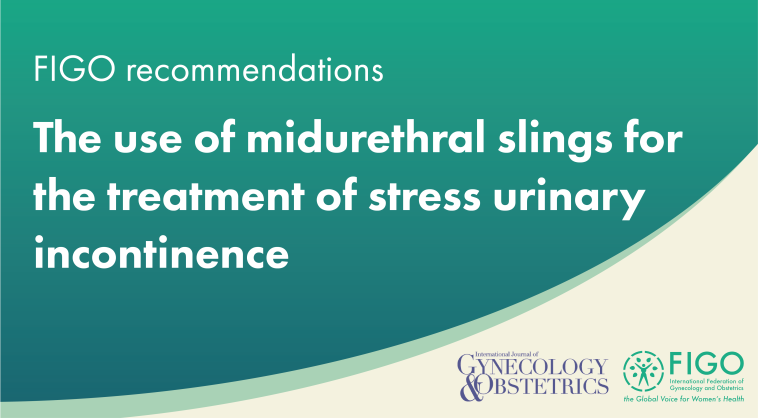New FIGO recommendations on the use of midurethral slings for the treatment of stress urinary incontinence
The International Journal of Gynecology and Obstetrics (IJGO) has published new FIGO recommendations on the use of midurethral slings for the treatment of stress urinary incontinence.

The newly published recommendations, prepared by FIGO’s Committee on Urogynaecology and Pelvic Floor Disorders, provides evidence-based data and guidelines for obstetricians-gynaecologists treating women with stress urinary incontinence or planning on performing midurethral slings.
Background
Stress urinary incontinence is a global problem that can have significant adverse effects on women’s quality of life. It is defined as involuntary leakage of urine on effort or exertion, or on sneezing or coughing. The prevalence of female stress urinary incontinence is approximately 40%, and the incidence tends to increase with advancing age.
The use of synthetic mesh in vaginal surgery is controversial, especially when used for pelvic organ prolapse surgery. Although negative effects have been reported, the synthetic mesh midurethral sling is considered to be safe and effective in the surgical treatment of stress urinary incontinence.
In light of this, FIGO’s Committee on Urogynaecology and Pelvic Floor Disorders reviewed the available literature and prepared evidence-based guidelines for the use of midurethral sling for women with stress urinary incontinence.
Key takeaways
The committee found that despite the existence of extensive literature, there is a lack of consensus in the optimal surgical treatment of stress urinary incontinence. These guidelines provide a direction for surgeons to make appropriate decisions regarding management of stress urinary incontinence.
The midurethral sling is considered safe and effective in the treatment of stress urinary incontinence, based on many high scientific quality publications and professional society recommendations.
Comprehensive long-term data and systemic reviews are still needed, and these data will become increasingly important as women live longer. The FIGO recommendations will be continuously updated through future literature reviews.